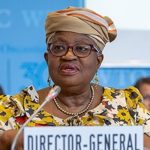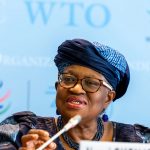Ngozi Okonjo-Iweala, Director-General of the World Trade Organisation (WTO), has stressed the urgent need to triple renewable energy production and double energy efficiency by 2030 to align with the Paris Agreement on climate change. She made these remarks during the recent Trade and Environment Week in Geneva.
Okonjo-Iweala stated, “We are at a pivotal moment where trade policies have become a powerful catalyst for environmental sustainability and offer a versatile set of tools for people-oriented clean energy transition.” She emphasized that adjusting tariff imbalances favoring higher-carbon goods over renewable energy equipment can lower costs and boost the adoption of low-carbon technologies. Additionally, addressing fossil fuel subsidies can encourage innovation and reduce emissions.
The WTO Chief explained that trade policy could align standards and certification processes, creating a stable policy framework essential for deploying renewable energy.
In a video message, Inger Andersen, Executive Director of the United Nations Environment Programme, highlighted the urgent need to tackle climate change and the dire consequences of rising temperatures. She said, “We know that greenhouse gas emissions must fall, fall fast, and never rise again,” stressing the importance of renewable energy in combating climate change. Andersen called for responsible, circular approaches to using critical minerals, advocating for trade policies that promote responsible mining while protecting local communities.
Celeste Saulo, Secretary-General of the World Meteorological Organisation, added, “Climate information should be part of every policy related to green energy transition.” She noted that a coordinated international effort to share climate data, facilitate technology transfer, and build climate-resilient infrastructure is crucial for ensuring the reliability and sustainability of renewable energy systems worldwide.
Francesco La Camera, Director-General of the International Renewable Energy Agency, urged alignment of trade policies with the clean energy transition, emphasizing that the current pace of change is inadequate to meet global climate targets. He remarked, “Although renewable energy has become the most competitive source of electricity worldwide, the market is still designed for fossil fuels.” La Camera called for immediate reforms, including lowering tariffs on renewable energy technologies and establishing international standards for environmental goods and services. He warned, “If we don’t change rapidly the way we produce and consume energy, the next two COPs will be the last chance to keep the 1.5°C target alive.”
Sofía Boza, Chile’s Ambassador, concluded by stating that trade and environmental policies must complement each other to achieve sustainability goals. She highlighted the potential of trade in facilitating access to essential clean energy technologies, asserting, “The energy transition offers a significant opportunity to diversify the productive base while creating added value in exports.”










